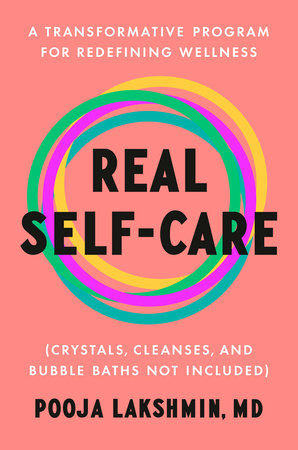Chapter 1
Empty Calories
Faux Self-Care
Hasn't Saved Us
Revolutions that last don't happen from the top down. They happen from the bottom up.
Gloria Steinem
My patient Erin, thirty-eight, a mom of three school-age kids, wanted to pull her hair out whenever she heard the term self-care. She was up before 5:00 a.m. most mornings, responding to emails, getting the kids ready for school, and then rushing into the office for a ten-hour day. In the evenings, she'd pick up the kids and prep dinner before helping with homework and bedtime routines. Around 9:30 p.m., she would open up her laptop again for another two hours of work.
"Just tell me, when in this chaos am I supposed to find time for self-care?" she lamented. "I don't need a two-hundred-dollar massage, though it sure would be nice. I need more than five hours of sleep a night."
Whenever Erin found a couple of minutes to look into doing something for herself, the advice she found felt painfully condescending: "learn how to meditate" or "make a gratitude list." Instead of giving her a sense of relief, these recommendations just made Erin feel bad. "If everyone else seems to feel better with a bubble bath and a glass of wine, what's wrong with me that I can't get it together to make that happen?"
Then there was Hina, twenty-nine, who was struggling to achieve that elusive work-life balance. In her pursuit, she found herself diving headfirst into optimization and productivity strategies. She was always the first in her group of friends to try out the new meal delivery service and was fortunate to be able to outsource household tasks from time to time. Her focus on productivity was theoretically in service of finding time to do self-care, yet Hina could never quite pour the time she gained back into herself. When she did grab an extra hour for herself, she felt irritated by the leftover dishes in the sink and plagued by guilt for not spending more time at work.
These stories are common in my clinical practice, where, as a psychiatrist, I specialize in women's mental health. I see women of all backgrounds and ages-single and partnered, mothers and those who are child-free. Some of these women are coping with depression or anxiety, but many are just struggling to figure out how to take care of themselves in the midst of incredibly busy and hectic lives-and that was before a pandemic raised our stress and anxiety levels to epic proportions. The commonality among all of these women is clear, though-they're struggling, and what they're doing to find relief isn't working.
The Broken Promises of Faux Self-Care
In the past few years, I've noticed something curious happening. For women, the cultural obsession with self-care has not only failed to provide solace, it has also added more guilt and pressure. A common refrain I hear in my practice is "I'm burned out, I just can't do it anymore, and I feel like it's my fault because I should be taking care of myself." Self-care ends up being another burden, another thing on the to-do list for women to feel bad about because they aren't doing it right. I call this the tyranny of self-care.
My patients feel beaten down and confused, and so do I. And, taking it a step further, many of us also understandably feel insulted and resentful that not only do we not have time for these "strategies," but even when we do them, they don't provide the relief that is advertised. Or on the occasions when they do work, the relief doesn't last long. We are right to recognize that it's ridiculous that the solution we are sold to the unrelenting demands of being a woman in the twenty-first century is a twenty-dollar bath bomb. Our culture has taken wellness and foisted it on the individual-where it can be bought, measured, and held up as personal success-instead of investing in making our social systems healthy.
Personally, I also know the allure of these supposed fixes all too well-I shared in the introduction about my wellness-cult deep dive. But even before that dramatic decision, in my early twenties I turned to yoga as a fix for being a burned-out medical student. It certainly helped at first-my weekly yoga class was a much-needed break from memorizing the Krebs cycle, and I felt stronger in my body. But like a pattern I observe with many of my patients, I brought the same perfectionistic mindset to yoga that I took to medical school. When I couldn't keep up with the rigid yoga schedule I had outlined, I quickly chalked myself up as a failure.
There was also that time I subscribed to Real Simple magazine, convinced that if I gained mastery over my out-of-control closet, a feeling of inner contentment would closely follow. (I'm only slightly embarrassed to report that there's still a pile of Real Simple magazines collecting dust at the bottom of my closet.)
The data backs up the fact that commodified wellness is not working. American women not only report higher stress levels than men but also feel they are not doing a good job of managing it. A 2018 Canadian study of more than two thousand workers found that women reported higher levels of burnout compared to men. A systematic review from the University of Cambridge conducted across Europe and North America found that women are nearly twice as likely to suffer from anxiety as men, and there is a similar discrepancy when it comes to depression. One in five women ages forty to fifty-nine and nearly one in four women sixty and over were prescribed antidepressant medications in the United States, according to data from 2015 to 2018. For women ages eighteen to thirty-nine, the number was closer to one in ten.
Yet, curiously, search Instagram and you'll find more than sixty million posts tagged with #SelfCare. They run the gamut from beachside yoga to triumphant mommy blogs to "curative" smoothie recipes. If we use social media as our guide, self-care appears to be . . . anything that looks good in a photo?
As I mentioned earlier, this is faux self-care-the wellness behaviors and practices that are commonly sold as a remedy for women's problems. In many cases, faux self-care is just a sugar high, serving as an escape from the realities of daily life and moving us further away from our true selves. Faux self-care is also big business. A report from the Global Wellness Institute found that the global wellness industry, which is targeted at women in particular, was worth $4.4 trillion in 2020. While products like crystal-infused water bottles and vagus nerve pillow sprays might elicit a temporary sense of calm (putting aside the fact that they are too pricey for most American women), they do nothing to change the social systems that have us craving relief in the first place-so the cycle of consumerism continues unabated. Faux self-care is faux because when used alone, without the critical internal work we will discuss in this book, it does nothing to change our larger systems.
A Note on Social Media Influencers
If you're like me, you might find yourself browsing Instagram or other social media apps and wondering how on earth women find the time to have a perfectly curated home, gorgeous children, and on-point hair and makeup. It's so easy to look at influencer accounts and feel like "Wow, they're doing it, it looks so easy-why do I feel like a mess?" And when they share about a wellness product, it's understandable to be curious and think, "Maybe this product is the perfect solution to my problems!"
When you find yourself feeling this way, I encourage you to take a beat. Because influencers are on our phones, and our phones are with us all the time, it's easy to feel artificially close to them. But remember that social media is a highlight reel. When you see an influencer touting a wellness product, look to see if this person is being paid to promote it (i.e., it's a sponsored post). Influencers have the opportunity to play a role in shifting the dynamic in commodified wellness, and while some do speak up for social and policy change, not all are discerning about the wellness industry. Pay attention to which issues they speak up on, how they disclose the behind-the-scenes of their own lives, and what sort of vetting they do when promoting wellness products. If you notice that an influencer is not engaging in transparency or due diligence, reflect on if following them is making you feel better or worse about yourself. While there is a growing cohort of influencers who are making informed and conscious decisions about how they engage with the wellness industry, the social media space is still very much the wild, wild west. As a prime target of the wellness industry, you are exerting agency-and thus power-when you apply a critical lens to how you engage with influencers and social media marketing.
Self-Care: It Hasn't Always
Been Tyrannical
Because self-care is everywhere you turn these days-whether it's social media, podcasts, or our text threads with friends-it's tempting to believe that it's a uniquely twenty-first-century concept. The reality is that the 2020s version of self-care has come a long way from its beginnings. It turns out that self-care has two major lines of origin: health care and social justice. Self-care's origin story is fascinating and helpful for understanding why faux self-care occupies the large and expanding space it does today. Inside its origin story, we can also find some clues on how to reclaim self-care as our own.
Seventy-some years ago, in the 1950s, psychiatrists used the term self-care to describe the ways in which institutionalized patients could assert independence by taking charge of their diets and engaging in exercise while in the hospital. By the 1960s, nursing and medical professionals talked about their own need for self-care in response to compassion fatigue and secondary trauma. Fast-forward to the 1970s and self-care moved from the medical community to activist circles, with the Black Panther Party promoting self-care as a means for Black Americans to preserve their humanity in the face of systemic racism. It was Black women who actualized the concept into public discourse. Audre Lorde defined self-care as a powerful act to reclaim space within a society that demanded minorities and oppressed groups stay small or invisible. As she wrote in her 1988 book, A Burst of Light, "Caring for myself is not self-indulgence, it is self-preservation, and that is an act of political warfare." As we'll discuss in Chapter 3, real self-care is built on this very notion and, when implemented authentically, has the potential to change our broken system.
By the 1990s, as the economics of health care in the US were shifting, health-care professionals began encouraging patients with chronic medical conditions like diabetes and high blood pressure to take primary responsibility for their health as opposed to being passive recipients of care. Researchers found that for those living with chronic illnesses, self-care in the form of exercise, healthy diet, stress management, and other lifestyle interventions was associated with better health outcomes.
Self-care as the so-called cure that we now know it as evolved when the world became more hyperconnected. As we transitioned to smartphones, a twenty-four-hour news cycle, and a plethora of ways to keep up with family, friends, and complete strangers via social media, we also saw a parallel need for a balm from that stimulation overload. Self-care was no longer relegated to the realm of health, nor was it about standing up against oppressive systems. Instead, it morphed into a release valve, designed to bring you a momentary sense that things are all right. By the 2010s, the term self-care had exploded on social media and in the daily fabric of women's lives. The more out of control and dysfunctional our social structures became, the more our social media feeds were filled with glossy images of women seemingly living their best lives in picturesque locations. (Interestingly, Google searches for self-care peaked in November 2016, following election night in the United States.)
As a psychiatrist, I'm understandably interested in the connection between the explosion of faux self-care and the status of mental health treatment. While not everyone who engages with faux self-care needs professional mental health services, the symptoms of a major depressive disorder or a clinical anxiety disorder have quite a bit of overlap with those of burnout and chronic stress. But mental health treatment (like seeing a psychotherapist or a psychiatrist) is financially costly and typically not covered by insurance, and so remains inaccessible to many. It also takes time. The work of psychotherapy is not instantaneous-it can take months to see some progress (or to even get off a waiting list to be seen!). Similarly, trying to find the right medication can also take time. On the other hand, the seemingly easy and shiny solutions of faux self-care are, well, so much more simple and sexy. Why fight with with your insurance company when you can buy a vitamin pack that your favorite influencer recommends, and it will be delivered to your door the next day?
So we can't talk about faux self-care without talking about mental health treatment. We also can't talk about any of this without acknowledging there is a huge gap in access to affordable mental health services. There are several parts to the interplay between mental health and wellness solutions-first, a lack of education and awareness for many women about what constitutes a clinical mental health condition. Then, there's the stigma that still exists around seeing a therapist or a psychiatrist. Finally, once you've crossed all of those not-insignificant hurdles, there is the lack of insurance coverage, and the fact that finding access to a good therapist and psychiatrist is still only possible for the most privileged in our society. It's in this context, where actual treatment for mental health conditions is inaccessible for the vast majority of folks, that our culture serves us faux self-care as a quick fix and as a poor substitute for professional help. I don't mean to shame anyone here-in fact, when you are clinically depressed or anxious, finding a therapist and calling up your insurance company is even more difficult. It's no wonder that we are vulnerable to the slick marketing of faux self-care.
The time has come for self-care to evolve again, to take on a new definition. And that definition requires looking deeper, turning inward, and developing a reliable internal method for yourself-not one that has been prescribed for you by a wellness company or an influencer, but instead a solution that comes from you.
Copyright © 2023 by Pooja Lakshmin, MD. All rights reserved. No part of this excerpt may be reproduced or reprinted without permission in writing from the publisher.






